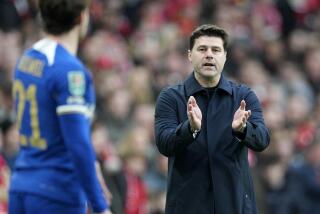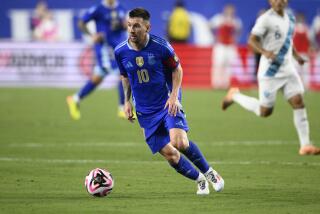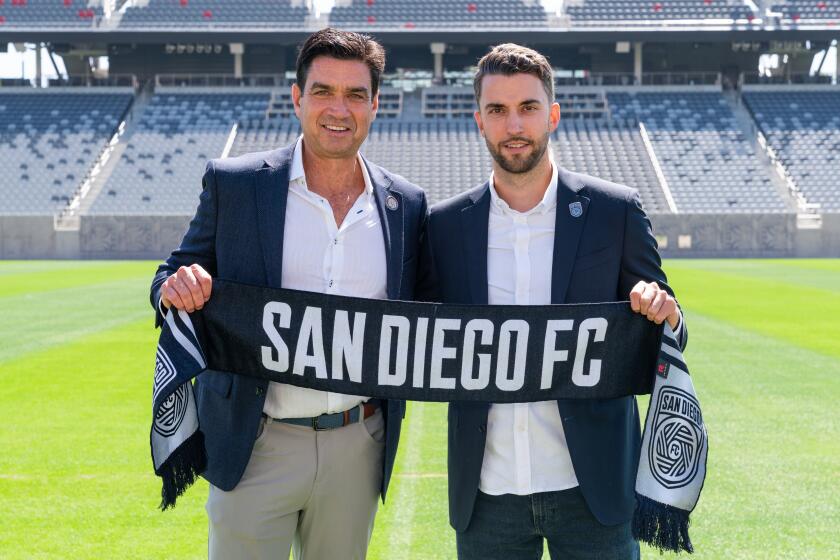Weathering a Storm in Argentina
The post-Diego Maradona era has begun for Argentina, which is rebuilding from the ashes of its most brilliant player’s drug violation and ejection at the 1994 World Cup and the team’s early exit after its shocking losses to Bulgaria and Romania.
The talented but troubled Maradona, who led Argentina to a victory over England in 1986 with his infamous “Hand of God” goal, had spoken of making another comeback but abandoned his plans last fall. That sends Argentina, the 1978 and 1986 World Cup champions, to France with many questions regarding its lineup and the strategy of Coach Daniel Passarella.
For the record:
12:00 a.m. June 10, 1998 For the Record
Los Angeles Times Wednesday June 10, 1998 Home Edition Sports Part C Page 7 Sports Desk 1 inches; 28 words Type of Material: Correction
Soccer--The individual schedules of games with each World Cup group in Tuesday’s special section listed Eastern times. The complete schedule of games on Page S8 listed the correct Pacific times.
“Before, Argentina depended only on Maradona,” said Passarella, who was captain of the 1978 championship team and had the privilege of hoisting the trophy in his homeland. “Now, it must depend on 11 players.”
Placed in Group H with Jamaica, Japan and Croatia, Argentina faces many uncertainties as it tries to live up to its heritage.
Most of those questions center on the stormy relationship between Passarella, an intense and unbending disciplinarian, and flashy striker Gabriel Batistuta, who has been nicknamed “Botigol” for his scoring exploits with the Italian team Fiorentina and has twice led Italy’s Serie A in scoring.
Passarella was much loved as a player in Argentina, scoring an impressive 24 goals in 71 international appearances while playing sweeper. As a coach, however, he has raised some hackles by stifling locker-room dissent, banning sex before matches and prohibiting players from wearing long hair or earrings. His battles with Batistuta have also brought him heavy criticism from fans and the media, as has his use of 50 players during qualifying matches without creating much on-field cohesion.
Passarella left Batistuta, the team’s most popular player and most potent scoring threat, off the team for several World Cup qualifying matches. Passarella also threatened to leave him off the squad for France unless the all-time leading scorer for Argentina agreed to play the way Passarella wants. It wasn’t an empty threat, because Passarella had similar battles with midfielder Fernando Redondo and did leave Redondo off the roster.
Batistuta did obey his coach’s request to trim his flowing hair, but it’s unclear whether he will completely conform to Passarella’s wishes. If Batistuta isn’t happy and productive, Argentina will suffer. He had four goals in the 1994 World Cup, including a hat trick against Greece in the opener, and since his 1991 national team debut has scored 38 goals in 59 games.
With Batistuta in and out of the lineup and other players having so-so seasons at the club level, Argentina lost a 2-1 decision to Bolivia early in the qualifying process and absorbed a dispiriting 2-1 loss in a friendly with Israel, a non-World Cup qualifier. Although that was termed a disaster by Argentine fans and media, Passarella’s team has also recorded solid victories over Brazil and Ireland in April.
Instead of making Batistuta the focal point of the offense, as seems logical with a proven scorer, Passarella has been favoring Hernan Crespo of Parma, who played for him when Passarella coached the Argentine team River Plate. “I like one of my forwards to play on the outside and one to play down the middle,” said Passarella, who is as distinctive for his chain-smoking and the dapper suits he wears. “Crespo is more willing to play to this style.”
Claiming Crespo and Batistuta were too much alike to successfully work together, Passarella paired Crespo with Claudio Lopez of the Spanish team Valencia. However, it’s likely Batistuta will also start up front to form a three-pronged attack.
Only a few days before the June 2 roster deadline, Passarella added forward Abel Balbo of AS Roma, increasing his options up front. He is certain to find a key role for creative playmaking forward Ariel Ortega, who was the only player selected for all 16 of Argentina’s qualifying matches. The key is for the midfield to be able to find and feed this potentially lethal group.
Although Argentina’s formation remains uncertain, Passarella will be able to draw upon several key assets.
The midfield, although not brilliant, is dependable. The leader is the consistent Diego Simeone, who has played in Italy and Spain and currently plays for the Italian club Inter Milan. Juan Sebastian Veron of Sampdoria, 22, is also considered promising after orchestrating many offensive forays in qualifying games. Nicknamed “the Witch,” he’s a clever passer and has a powerful shot.
The defense has ample international experience and is more than capable, led by Roberto Ayala, Roberto Sensini and Jose Chamot. However, goalkeeping, long a strength for Argentina, this time might be a vulnerable spot. Passarella has alternated among several goalies and apparently has settled upon Carlos Roa of Mallorca as the starter, even though Roa has made only five previous international appearances at age 27.
The World Cup will probably be the finale for Passarella as Argentina’s coach. “I think I’m about 99% sure I’d like to move on after the Cup, probably to Europe,” he said.
It will be interesting to see if he will go out sadly, as did Maradona, or if he can recapture a moment of glory before he departs.
(BEGIN TEXT OF INFOBOX / INFOGRAPHIC)
GROUP H
The Schedule
SUNDAY
Argentina vs. Japan, 8:30 a.m. (ESPN, Ch. 34)
Jamaica vs. Croatia, 3 p.m. (Ch. 7, Ch. 34)
JUNE 20
Japan vs. Croatia, 8:30 a.m. (ESPN2, Ch. 34)
JUNE 21
Argentina vs. Jamaica, 11:30 a.m. (ESPN2, Ch. 34)
JUNE 26
Argentina vs. Croatia 10 a.m. (ESPN2, Ch. 34)
Japan vs. Jamaica, 10 a.m. (ESPN, Ch. 34*)
* Highlights








